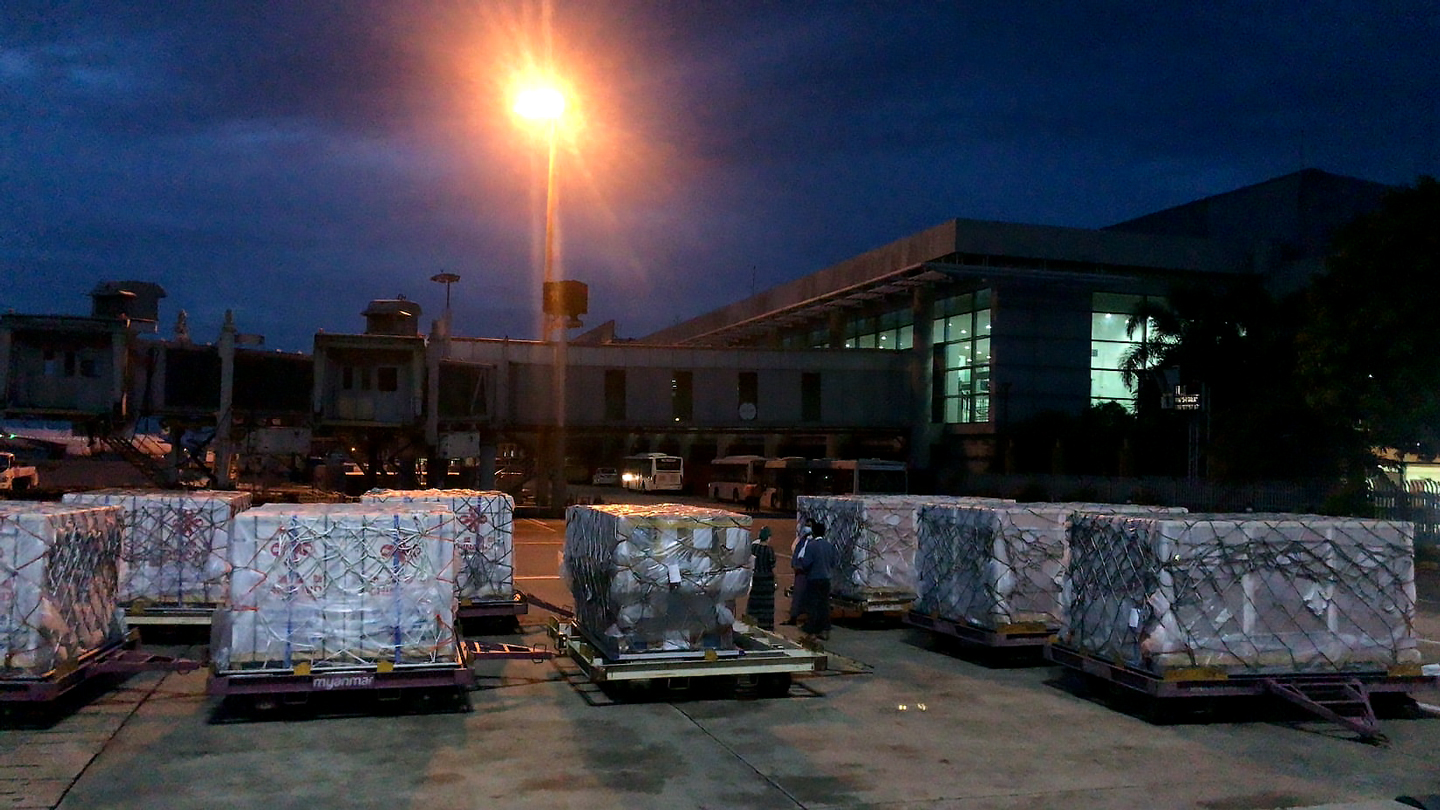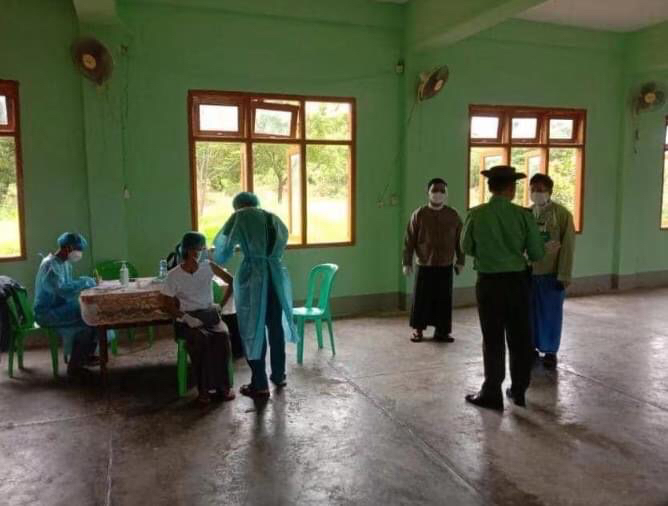Air China planes were landing at Yangon International Airport all through the rainy nights last week, bringing in desperately-needed COVID-19 vaccines to the city that is at the epicenter of the deadly third wave of coronavirus in Myanmar.
With hundreds of people believed to be dying daily from COVID-19 in Yangon, the military regime has struggled to source vaccines from any other country than China, a reflection of how much of the rest of the world regards the junta as an illegitimate government.
So far, Beijing has dispatched three million vaccine doses to Myanmar: two million of the Sinopharm vaccine – donated free by China – and one million Sinovac vaccines purchased by the regime. The junta has plans to buy two million more doses from Beijing.
Since late last year, China has committed to providing COVID-19 vaccines to more than 80 countries under its “Health Silk Road”, a pharmaceutical extension of China’s Belt and Road Initiative (BRI).
Dubbed “China’s vaccine diplomacy”, the vaccines have mostly gone to countries already participating in the BRI. Critics claim that Beijing wants those nations to remain indebted to China. As a result, they will continue to support and allow Chinese infrastructure and connectivity projects in their countries.

Myanmar is one of the countries participating in the BRI and Beijing wants to invest in multi-billion dollar infrastructure projects from the country’s north to west. In particular, China craves access to the Indian Ocean via the port of Kyaukphyu in western Myanmar’s Rakhine State, which will enable its ships to avoid passing through the strategic and vulnerable Strait of Malacca.
Myanmar’s COVID-19 vaccine program has struggled since the military’s Feb. 1 coup, with millions of civilians refusing the jab and thousands of health workers on strike in protest against military rule. Amid a rapid surge of coronavirus, the regime-controlled Ministry of Health and Sports (MOHS) has repeatedly urged citizens to get the Chinese shots, lauding the efficiency of the vaccine in reducing infection and death rates.
China’s Sinovac and Sinopharm vaccines are 50% to 79% effective in preventing symptomatic Covid infection, according to clinical trials across the globe.
However, those countries in Southeast Asia that have mostly relied on Chinese vaccines – Indonesia, Thailand, Cambodia and Malaysia – are still seeing a spike in infections, despite a high take up by people of the vaccines. Thailand has now changed its vaccine policy and is offering a mix of Sinovac and the British-Swedish AstraZeneca jab.
Indonesia, where 90 percent of the vaccines used in its vaccination program are Sinovac, is now the COVID-19 epicenter of Southeast Asia. More than 30 health workers have died and hundreds more have become infected, despite receiving two doses of the Sinovac vaccine.
Now Indonesia, the largest country in Southeast Asia, has said that heath workers will be given booster jabs of the US-made Moderna vaccine alongside Sinovac shots. Malaysia has also announced that it will stop using Sinovac once its supplies end, saying that it has a sufficient number of other vaccines, including the Pfizer-BioNTech mRNA vaccine, for its vaccination programme.
Those decisions have raised fresh concerns about the efficacy of Chinese vaccines against the more transmissible Delta variant currently sweeping through Myanmar.
In late July, the former deputy director of the Chinese Centre for Disease Control and Prevention, Dr. Feng Zijian, admitted that antibodies triggered by the two Chinese Covid-19 vaccines are less effective against the Delta variant compared with other strains. Moreover, a recent study from Hong Kong University found that the antibody level of people inoculated with the Pfizer-BioNTech vaccine is ten times higher than those generated by the Sinovac vaccine.
However, Beijing appears only to care about the success of its vaccine diplomacy and not about the effectiveness of its vaccines. Four months before the Sinovac vaccine was approved by the World Health Organization (WHO) as safe for emergency use, China gave it to some of the ethnic armies who control areas of Shan and Kachin States along the frontier with China.
The United Wa State Army, Myanmar’s largest ethnic armed group, started its vaccination program in late February, according to an announcement on WeChat. It has vaccinated almost all of its 550,000 population in its self-administered territory that covers six townships across two districts in Shan State.
The Kachin Independence Army has also vaccinated more than 30,000 people in the areas it controls in Kachin State, after receiving vaccines from China from late February on. Beijing was quick to offer vaccines to the ethnic armed groups in Myanmar’s borderlands not only because it has close links with them, but because it is concerned about unvaccinated people moving across the Myanmar-China frontier.
Get a Chinese shot or Boycott Them
Despite the political and health crisis in Myanmar under the military regime, people have mixed reactions to the Chinese jabs. Some have said that they are better than nothing, but others say that they do not want to take Chinese vaccines as a show of resistance against the junta and its ally China, as well as because of the vaccines disputed efficacy.
Anti-China sentiment has risen dramatically since the coup, after China showed its support for the regime. Two think tanks run by Myanmar citizens based in Yangon conducted anonymous online surveys about whether people are willing to get Chinese vaccines under the regime’s vaccination program.
Of the 55,000 people surveyed by one of the think tanks, 90 percent said that they won’t take the Chinese jabs for two reasons. The first reason was that people don’t recognize the regime as the legitimate government of the country. The second was that they do not believe in the efficiency of the Chinese shots and they want to boycott Chinese products, as they believe that Beijing supports the junta.
Another think tank group polled 7,000 people in its survey. Over 87 percent of them would refuse the Chinese vaccines as they mistrust the junta’s vaccination program. All said that they do not trust the efficacy of the Chinese jabs, in part because of their failures elsewhere in the region.
When the Chinese Embassy in Yangon announced that Sinopharm and Sinovac vaccines had arrived in Myanmar, nearly a thousand of Facebook users said that they won’t get Chinese shots. Nevertheless, the regime launched the Sinopharm vaccine in major cities like Mandalay and the capital Naypyitaw, prioritizing people aged above 65.
TV reports from regime-controlled media showed that only a few senior citizens showed up for Sinopharm jabs in Mandalay for the first three days. Later, it announced that it had administered the jabs to school teachers and prisoners in Yangon and Naypyitaw. The regime said that it would prioritize the vaccine program for health workers and other essential staff, including those in the banking, wholesale and retail sectors.

One 68-year-old woman in Mandalay said that she is happy to receive the Sinopharm vaccine as she is worried after most of her neighbors caught the virus.
“Two of my friends have died of COVID-19. I was very frightened. So I decided to take the jab,” she said.
But many residents in Yangon are skeptical of Chinese vaccines and refuse the jab to defy military rule. A resident of Thaketa Township in Yangon, a neighborhood badly hit by the virus, told The Irrawaddy that “at least one or two people from every household in my ward are infected with COVID-19. It is too late for those people to get the vaccine”.
“Personally, I won’t take the Chinese shot because China supports the regime. By offering the vaccine, they are helping to make the junta legitimate. I do not believe them,” he added.
Dr. Thuzar Aung, a medic participating in the civil disobedience movement, suggested that everyone should take the vaccine, but she also said that the regime’s vaccine rollout won’t help to curb the spread of COVID-19.
“The efficiency of Chinese shots against the Delta variant is highly questionable. If there was no coup, our vaccination program might have been successful. Thousands of people who have died might not have done so. And we wouldn’t have to rely on vaccines made by the country that supports the junta,” she said.
“Now people are simply refusing to take the jabs because they don’t trust the regime,” she said.
The ousted National League for Democracy (NLD) government relied on Covishield, produced by the Serum Institute of India, which has demonstrated 95% efficacy against Covid-19. Last December, the NLD agreed to buy 30 million doses from India as part of an ambitious program to control the spread of coronavirus. It received the first 1.5 million doses from India as a gift in January.
The NLD also submitted a request to join the COVAX program run by the WHO and the Global Alliance for Vaccines and Immunisation, which aims to provide millions of doses to the most vulnerable people in 92 poor and middle-income countries.
Under the civilian NLD government, the plan was to have vaccinated 40 percent of Myanmar’s population by the end of 2021, with 20 percent of the vaccines provided by the COVAX program and 20 percent from vaccines bought by the government and approved by the WHO and the US Food and Drug Administration. Those plans were ended by the coup.
Now, the MOHS has said that it has only received 3.5 million Covishield vaccines from India. And of the 500,000 Sinopharm vaccines donated by China in May, 200,000 doses have gone to the Myanmar military.
As of July 18, more than 1.6 million people had been vaccinated, according to health minister Dr. Thet Khaing Win. That accounts for just over two and half percent of the population. Nor have the five and half million vaccines from COVAX which were supposed to be sent in March arrived. They have reportedly been delayed after the junta failed to provide details of its planned vaccine rollout.
Despite that, Dr Thet Khaing Win said that 50 to 55 percent of the country’s population is expected to be vaccinated by the end of the year. Regime-controlled newspapers continue to urge people to use whatever vaccines the junta offers them.
A business man in Yangon’s Botahtaung Township told The Irrawaddy, “I count every death of COVID-19 as someone who was killed by the regime. Without the coup, we wouldn’t be facing this situation. People have already sacrificed a lot in the fight against military rule,’ he said.
“I know that we are facing a deadly virus,” he added. “But I don’t want to kneel down to the junta for the vaccine. I will never do that. But, more importantly, I do not trust either the junta or the Chinese vaccine.”
You may also like these stories:
Ethnic Shan Party Slams Myanmar Junta for Scrapping 2020 Election
Some 10,000 Villagers Flee Fighting in Myanmar’s Sagaing Region
Flooding on Myanmar-Thai Border Threatens Imports of Oxygen Needed by COVID Patients

















